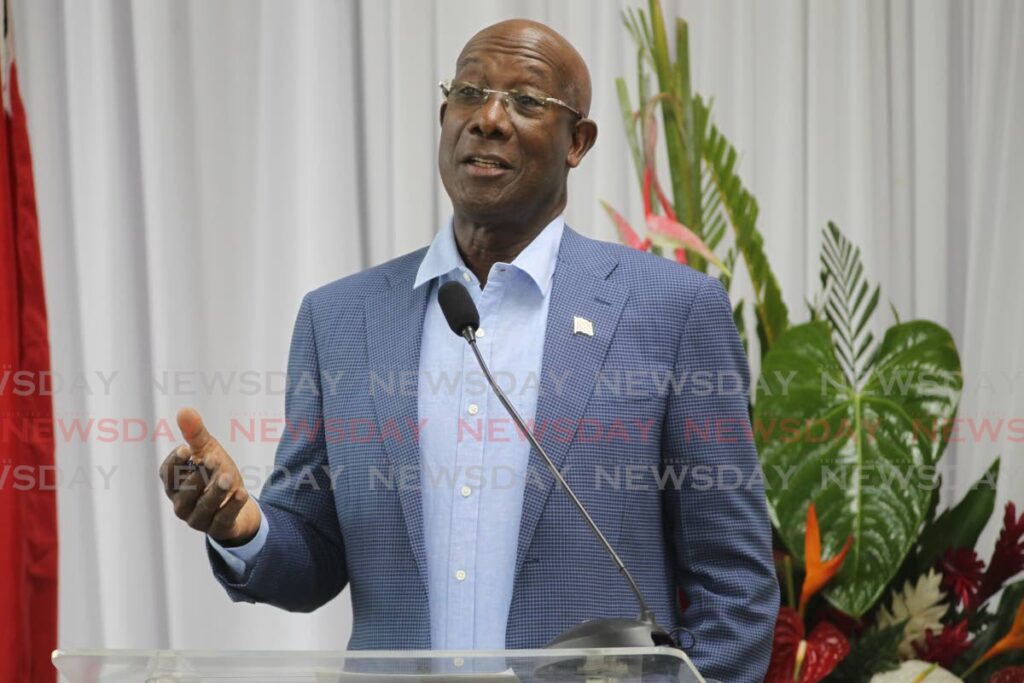PM: Government operationalising procurement law

THE Prime Minister said Government will do its best to make sure that the newly proclaimed Procurement Act works for the benefit of everyone in TT.
Dr Rowley gave this assurance at a news conference at the Diplomatic Centre in St Ann's on Tuesday.
On April 26, President Christine Kangaloo on Wednesday proclaimed dozens of sections of the Public Procurement and Disposal of Public Property Act, No. 1 of 2015.
Rowley noted numerous challenges faced by past governments to implement effective public procurement legislation.
He rejected claims from some people that Government was obstructing the proclamation of the law because it had an interest in acting in the awarding of contracts and other activities
"I simply want to say that nothing is further from the truth."
Before the conference, Rowley disclosed there was a meeting between government ministers, permanent secretaries and officials from the Urban Development Corporation of TT (Udecott) about operationalising the act. He described the meeting as fruitful
He recalled it was former prime minister Patrick Manning who said while laws were not perfect, they could be implemented and corrected if necessary at a later time.
Upon returning to office in September 2015, the PNM sought to make public procurement law as operational as possible.
Rowley observed many of the critics of the law were people who hard not read it, misunderstood certain things about it and had false expectations of it."Therefore I expect that there will be some serious disappointment in several quarters."
Under the law, Rowley said the Office of Procurement Regulator (OPR) does not award contracts.
The OPR, he continued, will not be "adjudicating on contracts unless there are complaints or issues with contracts."
Rowley said one of the most important things at this stage was to ensure that the public service understands how the law will be operationalised.
Having met with the permament secretaries and government ministers to discuss the operationalisation of the act, Rowley said Rural Development and Local Government Minister Faris Al-Rawi and Finance Minister Colm Imbert will have discussions with their respective stakeholders on this matter.
He added, "I'm also going to provide the resources and the Tobago House of Assembly (THA) to do that (conduct public procurement discussions) in Tobago."
Rowley anticipated this process will takes some time because procurement takes place across the entire spectrum of the state.
"It behooves all persons involved in managing governments and distributing or managing the assets in terms of contracting to become familiar with the law."
He described the law as very complex and could easily be misunderstood by some people.
Rowley cited the exclusion of government to government arrangements by the OPR as an example.
He reminded the media that the acquisition of two Cape Class patrol vessels for the Coast Guard as well as fast ferries for the domestic seabridge were done by such an arrangement with the Australian govermment
"That has to be a decision of the administrative directorate of the country to do that."
Rowley did not expect everyone to share that view.
He reiterated, "We believe that such an intervention by the government or any government is required if the government is to play the role as the primary decision maker on behalf of the wider citizenry."
Rowley said the Government must have the freedom to deal with the governments of other sovereign states on matters which require its intervention.
As prime minister and a parliamentarian, Rowley said, "We are not in the most comfortable place."
But he reiterated, "We now have to move with some evolution and understanding of this law to get the best out of it."


Comments
"PM: Government operationalising procurement law"